Northern Flickers tend to use existing nest cavities (rather than excavating new ones) more often than other woodpecker species and this bird followed that pattern. Last summer this cavity in Clark County, Idaho was used by a pair of Williamson’s Sapsuckers to raise their chicks. Flickers are 2.5 times larger (by weight) than the sapsuckers so the hole and cavity were too small for the flickers and it had to be “remodeled” for the them to gain access and use it for nesting. By the time I arrived on site a few days ago it was obvious that the entrance hole had already been enlarged and the male (males do most of the nest excavation) was working at enlarging the interior.
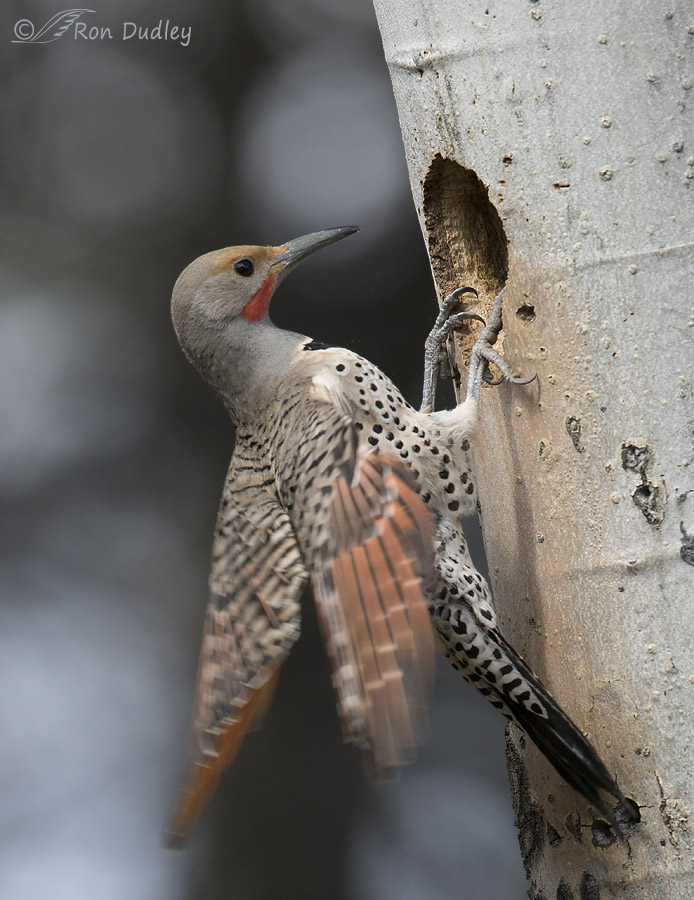
1/1000, f/7.1, ISO 640, Canon 7D Mark II, Canon EF500mm f/4L IS II USM, not baited, set up or called in
Here the male (red or black malar stripe is lacking in female) has just moved straight up the trunk to the nest hole so his wings are still moving and they’re blurry at this shutter speed. This much wing softness won’t appeal to many but the body, head and legs are sharp and I thought the wing motion-blur worked well enough to indicate the movement of the bird up the tree. Besides, I always enjoy seeing the reds on the wings that you typically can’t see when they’re folded.
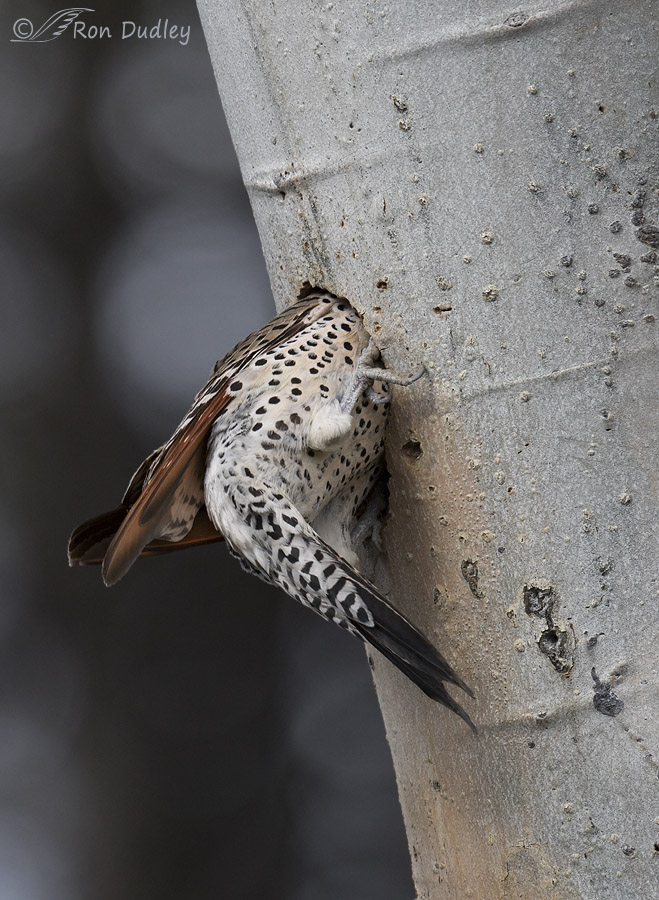
1/1000, f/7.1, ISO 640, Canon 7D Mark II, Canon EF500mm f/4L IS II USM, not baited, set up or called in
Then he entered the cavity. The entrance is barely large enough to accommodate the relatively plump bodies of the adults – in some of my photos it almost looks like he’s going to get stuck in the hole as he tries to exit the cavity.
Each time he entered the cavity I could hear him pounding away as he enlarged the interior. Then after a period of excavation when I couldn’t see him…
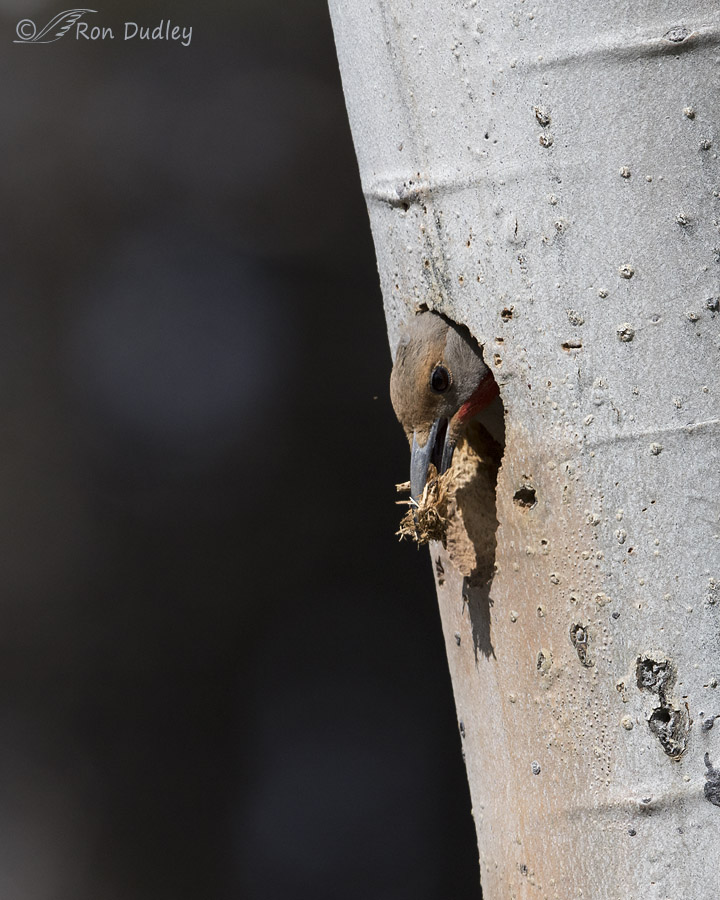
1/4000, f/7.1, ISO 640, Canon 7D Mark II, Canon EF500mm f/4L IS II USM, not baited, set up or called in
he would appear at the entrance with a beak-full of wood chips. The light angle was such that I was seldom able to get light in the eye for the split second I could see him before he…
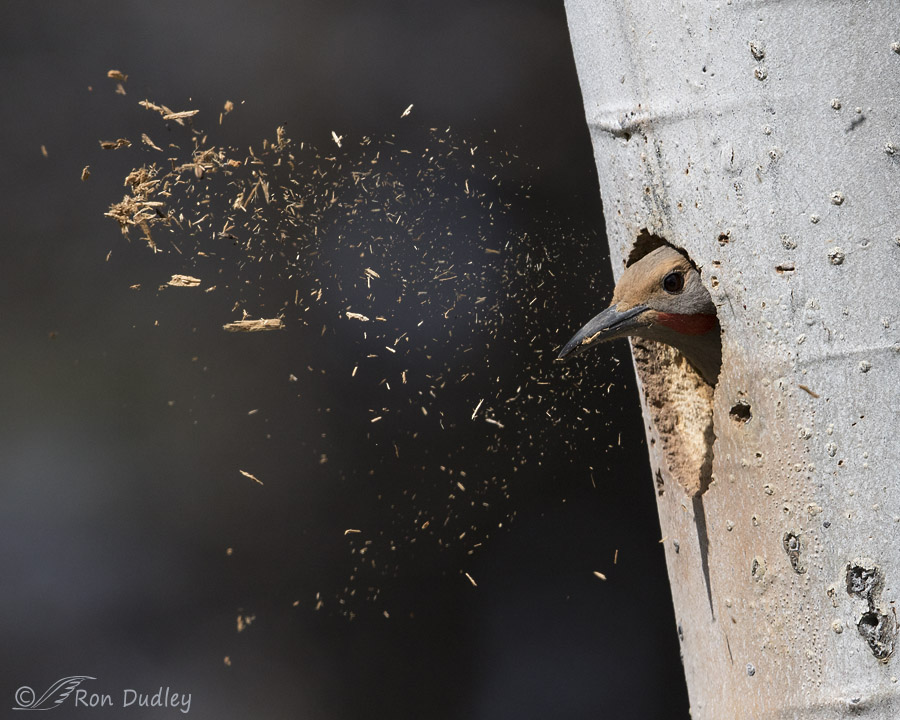
1/4000, f/7.1, ISO 640, Canon 7D Mark II, Canon EF500mm f/4L IS II USM, not baited, set up or called in
shook his head vigorously and sent the wood chips flying. Against this dark background the chips show up pretty dramatically.
This bird never flew off to discard the chips away from the nest tree like the sapsuckers often did last year. The difference may be that by the time I photographed the behavior in the sapsuckers the nest was already full of excrement-producing chicks so the chips were soaked in wastes. I’m guessing that the reason the sapsuckers usually hauled them away from the nest had to do with nest safety and potential predators.
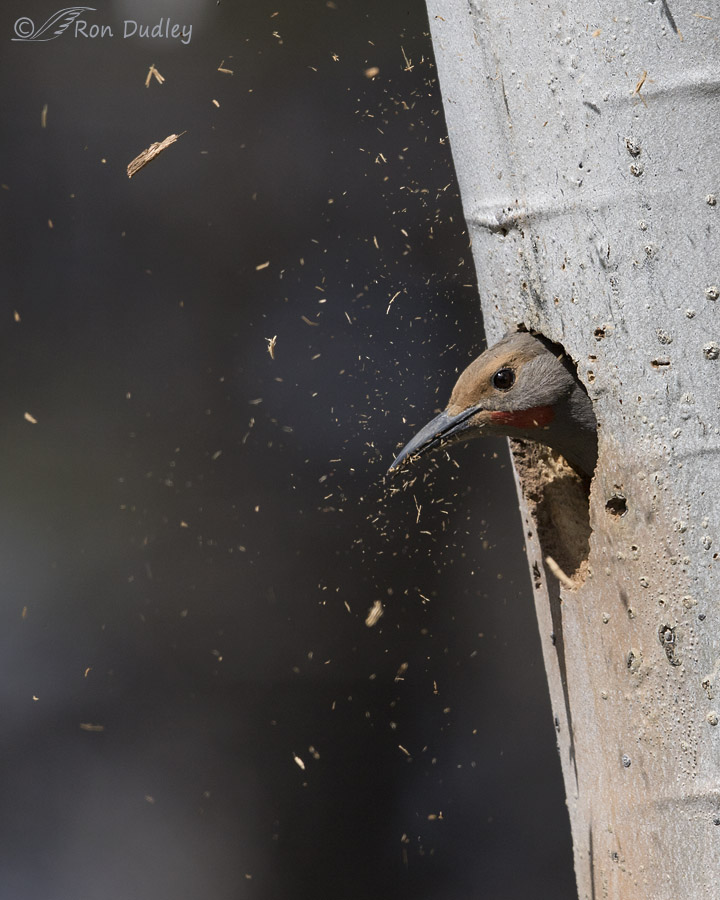
1/4000, f/6.3, ISO 500, Canon 7D Mark II, Canon EF500mm f/4L IS II USM, not baited, set up or called in
I photographed the chip-discarding behavior many times but as he violently shook his head it was very difficult to get light on the face. This is one of the few times I succeeded.
As I’ve said in previous posts there’s still a lot of competition among various species for several of the nest cavities and incomplete holes in this aspen but due to their larger size and aggressive behavior I suspect that it will be flicker chicks coming out of this cavity in a few weeks.
I wish them a successful nesting season.
Ron


What a buzz saw! Terrific sequence.
When I was on the Architectural Review Board in my town, I tried to convince commercial builders to avoid reflective, mirror-like exterior finishes…because of the number of birds that would fly into them and break their necks. In a nearby town, Pepsi and IBM built such buildings and one of them, I was told, actually hired a guy just to pick up the dead birds. Needless to say, I won’t buy either product.
Ron, I’ve never seen the red on the wings and did not know it was there. The NoFLs we see in our back yard are just moving through. No snags for the, to excavate. Thanks.
Wonderful amazing shots Ron! Thanks for sharing!
Charlotte
Just heard a terrible thud against the window and went out to see what it was. There on the patio was a beautiful, bright eyed, female rose-breasted grosbeak lying on her side, but unmoving…her little heart beating rapidly. I had hope that she might rouse herself and fly off. I didn’t want to stress her further, so just kept my distance, guarding her from predators. After a few minutes, she stretched her wing out fully, revealing the brilliant yellow feathers under her wings, gasped for air a couple of times…and died. She was probably trying to avoid either a sharp-shinned or coopers hawk…I can’t help but wonder if there’s a nest full of eggs or babies somewhere around. Very, very depressing! I feel so guilty about that damned window….
I’m very sorry to hear that, Patty. And I know how you feel about both the bird and the window. Soon after I got home from shooting this morning I heard a bird hit my living room window but when I got outside there were no casualties that I could find. Glad for that…
I had the exact same experience with a female Rose-breasted Grosbeak flying into a picture window when I lived in Richmond, VA. She fell onto the solar panels we had leaning up against the wall under the window, so I went out and picked her up and held her. She died in my hands. Very sad experience, because, among other things, I knew she was in the process of migration. The only good part was that I would never have known what she was had I not gotten that close to her. She was at least as pretty as the male – just different.
Always heart breaking. It was a sparrow here which cannoned into the window and broke its neck. And I mourned.
Love it all. Including the motion evocative blur.
The discard spray reminded me of a dog we had. When given left over gravy and rice she would wolf it down, then expel the clean rice in a spray across the floor. And walls…
Wow, that sounds like a highly skilled dog, EC!
I wonder how they get those holes so perfectly round…..????
I wonder too, Patty.
Wow! Amazing shots! After all his hard work I hope his mate doesn’t decide to move to the city! Great observation about the excrement-laden chips vs the clean ones. I think you’re exactly right. Raptors that “shoot” from the nest don’t seem to have the same problem with predation.
I never did see the female, Larry. Perhaps the remodeled abode is his gift to her when she arrives…:)
Terrific sequence!
Count me as one who DOES like the wing blur. I keep expecting to come across a flicker carcass stuck in the cavity hole one day. It always looks like a very tight fit.
“I keep expecting to come across a flicker carcass stuck in the cavity hole one day”
I hope that’s something that neither one of us ever see, Wally. It sure does look tight though when the bird’s passing through.
Very nice series. I like the wing blur in the first photo – it suggests to me that the bird’s hold on the tree isn’t quite stable yet. I also love that you were able to capture this behavior.
Susan, I’m ok with that motion blur too. Surprised me because usually I’m not when it’s that pronounced.
Remodeling is such dusty work!
Yep!
How wonderful! I love being able to see these intimate behaviors so closely. Thank you so much for your talent and perseverance!
Behaviors are sort of my bag, Deborah. In all honesty I usually prefer to capture interesting behaviors than just pretty photos of birds.
haha … love these, Ron … fab capture of the shavings flying out the window!!!
“the shavings flying out the window”
I like the way you put that, Lois.
A wonderful narrative and images Ron! Good luck to the nesting pair.
Thanks very much, John!
Terrific sequence. This behavior is familiar to me. My wife expands our abode frequently.
Thanks, Dave. And I’m sure Betty’s only thinking of you when she does it. After all, she has to make room for all your photo and processing gear…